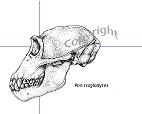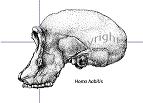The Symbiosis of Abstract Thought
with Hominid Evolution
Friday, March 31, 2006 → by Danieru
In humans, intelligence develops over time. A child learns primarily from the guidance of patient adults. Without strong social--that is, cultural--inputs, even a potential wunderkind will end up a bungling bumpkin as an adult. We now have evidence that this process of social learning also applies to great apes, and I will argue that, by and large, the animals that are intelligent are the ones that are cultural: they learn from one another innovative solutions to ecological or social problems. In short, I suggest that culture promotes intelligence.
[....]Although this new hypothesis is not enough to explain why our ancestors, alone among great apes, evolved such extreme intelligence, the remarkable bootstrapping ability of the great apes in rich cultural settings makes the gap seem less formidable. The explanation for the historical trajectory of change involves many details that must be painstakingly pieced together from a sparse and confusing fossil and archaeological record. Many researchers suspect that a key change was the invasion of the savanna by tool-wielding, striding early Homo. To dig up tubers and deflesh and defend carcasses of large mammals, they had to work collectively and create tools and strategies. These demands fostered ever more innovation and more interdependence, and intelligence snowballed.
Once we were human, cultural history began to interact with innate ability to improve performance. Nearly 150,000 years after the origin of our own species, sophisticated expressions of human symbolism, such as finely worked nonfunctional artifacts (art, musical instruments and burial gifts), were widespread. The explosion of technology in the past 10,000 years shows that cultural inputs can unleash limitless accomplishments, all with Stone Age brains. Culture can indeed build a new mind from an old brain.
- link to 'Why are some animals so smart?'
 I've been thinking a lot about cultural intelligence recently, most specifically in relation to the evolution of our consciousness.
I've been thinking a lot about cultural intelligence recently, most specifically in relation to the evolution of our consciousness.Further still, with several discussions raging on in the forum, I find myself questioning the very nature of Religion in the construction of this capacity for abstract thought.
As outlined briefly in the article above, human intelligence probably evolved in tandem with our complicated cultures. As the bonds in our societies became ever more crucial for our survival, and the tasks we carried out in these groups increased in their sophistication (such as tracking, hunting, tribalism and making best use of the great African savanna), so our brains evolved access to deeper levels of abstract thought.
 It is still difficult though, I would say, for ANY modern mind to make the leap from skinning antelope to plotting the designs for a nuclear reactor, and yet our biological capacities appear to have changed very little, if at all, in the time between these two cultural events. Put more simply, it is quite astounding to think that if a stone-age baby were thawed out from some arctic glacier tomorrow and brought up in modern society they would have equal chance of building a life for themself as the rest of us.
It is still difficult though, I would say, for ANY modern mind to make the leap from skinning antelope to plotting the designs for a nuclear reactor, and yet our biological capacities appear to have changed very little, if at all, in the time between these two cultural events. Put more simply, it is quite astounding to think that if a stone-age baby were thawed out from some arctic glacier tomorrow and brought up in modern society they would have equal chance of building a life for themself as the rest of us.Often I have talked about the evolution of religion, and how I personally believe it is an attempt by our brains to make sense of a universe we have lost an instinctive connection with. I have also never shied away from criticizing religious zealotry, in all of its many multifaceted forms - yet recently I have been struck by the complexity of such belief and what it could have added to our cultural, and maybe even biological, development.
 It is in the power of abstract thought that I find mankind's capacities the most awe inspiring. The most simple explanation for this ability must come from the primitive hominid's intimacy with its environment. Tracking prey over perhaps tens, hundreds, of square kilometres of the African savanna. Living in large, utterly self dependable social communities, replete as they are with the gossip, cooperation, back stabbing, love and camaraderie we all take for granted in modern contexts. But the ability which best fits our most abstract comprehension is that of the grand narrative. Whether it was talk of the days hunt, formed into a gripping tale of conflict, or an attempt by the alpha male to explain to his family why the rains came with such regularity, here is man's clearest cultural distinction from the great apes - bound up with, as if indistinguishable from, our species' capacity for language.
It is in the power of abstract thought that I find mankind's capacities the most awe inspiring. The most simple explanation for this ability must come from the primitive hominid's intimacy with its environment. Tracking prey over perhaps tens, hundreds, of square kilometres of the African savanna. Living in large, utterly self dependable social communities, replete as they are with the gossip, cooperation, back stabbing, love and camaraderie we all take for granted in modern contexts. But the ability which best fits our most abstract comprehension is that of the grand narrative. Whether it was talk of the days hunt, formed into a gripping tale of conflict, or an attempt by the alpha male to explain to his family why the rains came with such regularity, here is man's clearest cultural distinction from the great apes - bound up with, as if indistinguishable from, our species' capacity for language.And here is where mythology arose, here is where religion was born. Around those (clichéd) camp fires the very fabric of legend was woven by primitive intelligence into over arching narratives which would stay with us, in one form or another, for the remainder of our existence on this mortal coil. Surely here evolution played the greatest tricks with our consciousnesses, constructing ever more layers of neural matter within which language could lay down its narrative abstractions.
 In religious mythology can still be found some of the most enduring narratives our species has woven from that metaphorical fabric - so important to our perception as a people that they still persist with us to this day. Those eternal hunters of the African savanna, composing their tales of heroism so the children of their tribe could gasp in awe at the struggle with nature which surrounded them, were not merely casting light on the bounty of a hunt well executed. In their words, in their abstractions, in the awe of their children, the entire future of our species was being given its foundations. The greatest capacity of the conceptual human mind, I thus conclude, is in its ability to merge in symbiosis with its biological capacities and, in the process of doing so, actually take part in its own evolution.
In religious mythology can still be found some of the most enduring narratives our species has woven from that metaphorical fabric - so important to our perception as a people that they still persist with us to this day. Those eternal hunters of the African savanna, composing their tales of heroism so the children of their tribe could gasp in awe at the struggle with nature which surrounded them, were not merely casting light on the bounty of a hunt well executed. In their words, in their abstractions, in the awe of their children, the entire future of our species was being given its foundations. The greatest capacity of the conceptual human mind, I thus conclude, is in its ability to merge in symbiosis with its biological capacities and, in the process of doing so, actually take part in its own evolution.Via 3QuarksDaily!
Categories: Science, History, Evolution, Language, Nature, Consciousness, Reality, Human, Religion, Culture, Links, Ideas
|
|

 Links
Links Subscribe via RSS!
Subscribe via RSS!


 Via Email
Via Email


March 31, 2006 9:23 PM
April 01, 2006 7:47 AM
The Aboriginal people of Australia laid down roots in their homeland many thousands of years before similar tribal communities in Europe and Asia, so on first inspection the question arises: If they had more time, why did they not have a further developed culture?
The answer: environment.
The arid desert climate and poor soil of Australia made agricultural evolution a difficult prospect. On top of this there are apparently very few naturally occuring metals in Australia, so the invention of tools past the stone variety was never going to be an easy task. Further still, there are no native, large land animals in Australia. This at first seems insignificant, but try to think of European history without the domesticated horse, cow, sheep or pig. Civilisation comes not just from the human mind, it comes from what the human mind can do in the environment it finds itself in.
Humans of all ethnicity are capable of the same feats of mental abstraction, of social development, of innate intelligence. The factors that determine how human cultures evolved in the myriad ways they did cannot be understood by simply looking at the human entity alone.
The planet Earth is replete with contrasting climates, geology, wild life and plant life. It should come as no surprise that this diversity can be seen reflected in the human civilisations which evolved on its surface.
April 01, 2006 8:07 AM
Post a Comment